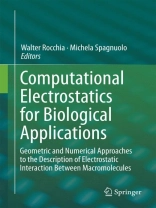This book presents established and new approaches to perform calculations of electrostatic interactions at the nanoscale, with particular focus on molecular biology applications. It is based on the proceedings of the Computational Electrostatics for Biological Applications international meeting, which brought together researchers in computational disciplines to discuss and explore diverse methods to improve electrostatic calculations. Fostering an interdisciplinary approach to the description of complex physical and biological problems, this book encompasses contributions originating in the fields of geometry processing, shape modeling, applied mathematics, and computational biology and chemistry. The main topics covered are theoretical and numerical aspects of the solution of the Poisson-Boltzmann equation, surveys and comparison among geometric approaches to the modelling of molecular surfaces and related discretization and computational issues. It also includes a number of contributions addressing applications in biology, biophysics and nanotechnology. The book is primarily intended as a reference for researchers in the computational molecular biology and chemistry fields. As such, it also aims at becoming a key source of information for a wide range of scientists who need to know how modeling and computing at the molecular level may influence the design and interpretation of their experiments.
Table of Content
ELECTROSTATICS and CONTINUUM SOLVENT MODELS Electrostatics models for Biology Classical density functional theories of ionic solutions Introducing charge hydration asymmetry into continuum electrostatics framework NUMERICAL APPROACHES AND SOLVERS ) Continuum electrostatics for Biological Applications: the Del Phi case Discontinuous Galerkin schemes for elliptic problems. Surface Electrostatics Using An Adaptive Cartesian Grid-Based Poisson-Boltzmann Solver Design, Development and Applications of the MEAD Suite for Macromolecular Electrostatics Progress and Challenges in Boundary-Integral Methods for Biological Electrostatics Efficient Boundary Element Method with curved elements for implicit solvation in biological systems Generalized Born forces: surface integral formulation. MOLECULAR SURFACE MODELS Molecular surface design with balls State-of-the-art and perspectives of implicit modeling for molecular surfaces A Generic Framework for Delaunay Mesh Generation and Optimization BROADENING THE VIEW Multiscale multiphysics and multidomain models for biomolecular systems Beyond computation, the representation of electrostatics in biological settings DEALING WITH COMPUTATIONAL COMPLEXITY Nano Shaper: a general and robust ray-casting based tool for processing surfaces at the nanoscale Triangulating Molecular Surfaces with Millions of Atoms Mixed MPI/CUDAimplementation for PB equation APPLICATIONS TO BIOLOGY AND BIOPHYSICS Control of DNA Minor Groove Width and Electrostatic Potential in Fis Binding Sequences Computing protein binding properties from molecular electrostatic potentials Comparative Poisson-Boltzmann equation calculations for binding free energies focusing on physical and algorithmic parameters Biophysical Applications of the Adaptive Cartesian Grid Poisson-Boltzmann Equation Software Package Structural and electrostaticdeterminants of interaction specificity in G-protein mediated signaling Using structural and physical-chemical parameters to identify functional districts in proteins – the role of electrostatic potential A Molecular Dynamics (MD) insight to the electrostatics of biological (lipid) bilayers. A tool for understanding electroporation mechanisms Modeling protein-ligand interaction with finite absorbing Markov chain Molecular Mechanics – Poisson Boltzmann Surface Area calculations using AMBER program package – application to the human dipeptidyl petidase III Long range Debye-Huckel correction for computation of grid-based electrostatic forces between biomacromolecules APPLICATIONS TO NANOTECHNOLOGY Modeling opto-electronic properties of a dye molecule in proximity of a semiconductor nanoparticle Modelling of spherical interpolyelectrolyte complexes Mono-functionalized beta-cyclodextrins as simple and sensitive testbeds for implicit solvation methods and model systems of host-guest interactions Specific Aspects of Counterion Condensation onto the Poly(styrene-sulfonate) Anion and Poly(allylammonium) Cation studied by Molecular Dynamics Simulations IPEC Solver: inter-polyelectrolyte complex formation within Poisson-Boltzmann theory












